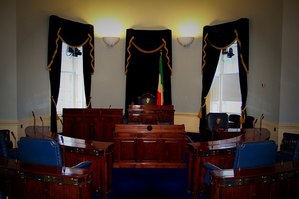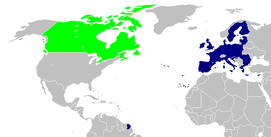|
It’s hard for me to believe now that less than three years ago I nearly voted to abolish Ireland’s Seanad (Senate, for my non-Irish readers). Fortunately, a more informed colleague talked me out of my rash decision at the last minute, but at the time I could see no value in retaining a tax-payer funded Seanad that seemed to have no power to influence government policy.
|
This week, I've discovered a new respect for Ireland's Seanad. Their unfortunate lack of influence in government policy makes their recent motion on the Comprehensive Economic Trade Agreement (CETA) all the more remarkable. Championed by Senator Alice Mary Higgins, the Seanad has found a way to potentially make global impact within a system that gives them very little power. Finally, we have a morsel of good news in a world of broken politics.
What is CETA?
The ratification by Member States could take several more years to complete, so the Council has the option to apply all or parts of CETA “provisionally” in the meantime. This means CETA could be implemented immediately after Council approval in October without waiting for approval of European Parliament or Member States.
The European Commission is in a hurry to avail of the benefits that could come from CETA and is pushing the Council to provisionally approve CETA asap. Given that an EC commissioned independent report predicted only a 0.02-0.03% increase in Europe’s GDP from CETA, it’s hard to understand the need to rush CETA through an undemocratic process, particularly given all the other rights we trade away in the process.
Why worry about the world of CETA?
The day before the Seanad motion, I briefed Senators and TDs in the Dail on the potential environmental impacts of CETA. You can listen to the 7min audio briefing on Sound Cloud, or read on below for a summary of concerns with respect to environmental protection and ultimately the protection of public goods and health.
Three major risks to our environment in the world of CETA:
1. The Investor Court System, formerly known as ISDS
We can look at NAFTA which has been in operation for 22 years and has an investor dispute system to evaluate the potential impact of ICS:
- Canada is facing $2.6 billion in challenges from American corporations under NAFTA, including challenges on bans against environmental harmful additives to gasoline, exports of hazardous PCBs and lawn pesticides, and moratoriums on fracking. Two-thirds of cases taken under NAFTA are on environmental issues
- Across the border, TransCanada recently announced it was suing the US government for $15bn after the Obama administration rejected the Keystone XL pipeline to pump oil from the tar sands of Canada on environmental grounds.
The ICS mechanism is especially concerning for climate change and the low carbon transition. Given the ratification of the Paris Climate Agreement in Europe, we know that each signatory country now has to change their laws and practices accordingly. However, under ICS foreign corporations have legal mechanism challenge anything that might negatively impact their profits and could therefore undermine the Paris Agreement, which (unlike CETA) is not legally binding.
CETA will impede our efforts to reduce fossil fuel extraction and fossil fuel use in the future by offering investor protection to energy and mining corporations without similar protection for environment and public health. CETA also specifies a “technology neutral approach” to energy cooperation, which compromises Europe’s transition to a society powered by renewables. For example, In 2012, the U.S. oil company Lone Pine used NAFTA to challenge Quebec’s fracking moratorium.
A final concern specific to CETA’s ICS is that even if TTIP is defeated (which looks possible), 40% US companies have subsidiaries in Canada and can therefore avail of CETA’s ICS to sue European governments as an alternative to TTIP.
2. Public services and utlities
As an example, the remunicipalisation of energy grids across Europe is becoming popular in places like Germany in an effort to broaden community owned power. This broadening of community owned power is also an aim of Ireland’s Energy White Paper. CETA could severely curtail efforts of community owned power in countries who failed to itemise energy distribution grids in CETA’s annex.
Unfortunately, Ireland’s Trade Minister Charlie Flanagan did not make a reservation for energy distribution grids under CETA, which contradicts our vision under the Energy White Paper. Nor did Ireland make a reservation for things like waste disposal, gas or oil, or waste water treatment. In general, Ireland has listed very few exemptions compared to other countries and this puts us at risk should we allow something to be privatised and then want to put services back into public ownership at a later date.
3. Risks to European agriculture
Canada allows hormones in animal products, has lower production standards, and allows carcasses to be cleaned using chemicals such as chlorine. As a result of such practices, Canada produces meat 60% cheaper than EU, so it’s not hard to predict that increasing Canadian imports could impact European farmers, particularly Irish Beef which would struggle to compete on price and scale with Canadian counterparts. This could also lead to a decline in the sustainability of European agriculture in an effort to improve competitiveness.
While Canada is not a major competitor with Irish agriculture, it is the combined pressure of trade agreements between Europe with Canada, USA and Mercosur (Brazil in particular) that would really put pressure on European and Irish farmers.
Over the summer, European agricultural ministers from 20 countries called for a study to determine the impact of TTIP, CETA and the Mercosur agreement on European agriculture. That effort was led by the agricultural ministers from Ireland and France. The report isn’t due until the end of this month after CETA is voted on and it hardly seems sensible to vote without adequate analysis on impacts.
CETA's bottom line
|
I’ve listened to Fine Gael politicians accuse those of us speaking out about CETA and TTIP as “fear mongering” and spouting “conspiracy theories”, but our voices not only include those from environmental NGOs but also health organisations, agricultural groups, trade unions, and even Nobel prize winning economists like Joseph Stieglitz.
|
|
CETA will curtail our efforts to reduce fossil fuel use, increase community-owned power and transition to a low carbon society by providing a mechanism for corporations to block this urgently needed transition. Those who support CETA are not working on behalf of the people of Ireland but rather to fill the pockets of corporations. It's #appletax all over again, only this time we don't even get a tokenistic debate in the Dail.
Why is Alice Mary's CETA win so important?
|
On October 5th, the Seanad approved a motion calling on the Irish government to reject provisional application of CETA. The Irish Parliament is the first in the world to take a vote on CETA. Independent Senator Alice Mary Higgins proposed the motion, which passed by one vote, garnering the support of The Civil Engagement Group, Labour, Sinn Féin, and the Greens, who all rejected the position of the Fine-Gael led government. At the beginning of the debate, Fianna Fáil spoke in support of CETA and Fine Gael’s position. However, the motion passed 17 to 16 due to the ultimate abstention of Fianna Fáil.
|





 RSS Feed
RSS Feed
